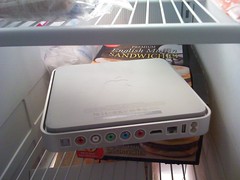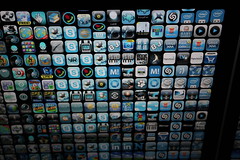 I will fully admit that a Twitter debate about Apple products is possibly the most First World thing in existence, but…here we are. Today I spent some time debating with a number of my library friends on Twitter about the relative merits of the Apple UI and whether or not it is superior and/or better in an objective way than it’s competition for the average user. One tweet in the stream that particularly caught my eye and made me feel like I needed to respond more fully was from Jenny Levine (@shifted):
I will fully admit that a Twitter debate about Apple products is possibly the most First World thing in existence, but…here we are. Today I spent some time debating with a number of my library friends on Twitter about the relative merits of the Apple UI and whether or not it is superior and/or better in an objective way than it’s competition for the average user. One tweet in the stream that particularly caught my eye and made me feel like I needed to respond more fully was from Jenny Levine (@shifted):
@griffey I used to think that because I haven’t seen blog posts or other pieces you’ve written that note/address Apple issues & problems.
I decided to poke around a bit. As it turns out, Jenny is right…I haven’t written much here about Apple’s shortcomings. So, I decided to list, once and for all, the Things that Bother People About Apple & Their Products (complete with why I don’t think they are a big deal):
The lack of ability to load apps on to iOS devices outside of the App Store
 I would love to be able to load apps directly onto my iOS devices outside of iTunes, whether for testing or just because I want to use an app that doesn’t fit into Apple’s licensing terms for entry into the App Store. Of course, I can do this…I could jailbreak my phone (and I have, whenever I wanted to test something non-Apple approved). There is a very good reason that Apple doesn’t allow this by default: the average user benefits from having a controlled ecosystem for their mobile device. It ensures stability, battery life, consistent interface, and (mostly) prevents malware. It has been suggested that the proper course of action here is for Apple to bury a “let me sideload” option deep in the Settings somewhere, and let people choose to open their device up if they want. However, having jailbroken my phone a half-dozen times, I will say: I have consistently reinstalled to the stock OS.
I would love to be able to load apps directly onto my iOS devices outside of iTunes, whether for testing or just because I want to use an app that doesn’t fit into Apple’s licensing terms for entry into the App Store. Of course, I can do this…I could jailbreak my phone (and I have, whenever I wanted to test something non-Apple approved). There is a very good reason that Apple doesn’t allow this by default: the average user benefits from having a controlled ecosystem for their mobile device. It ensures stability, battery life, consistent interface, and (mostly) prevents malware. It has been suggested that the proper course of action here is for Apple to bury a “let me sideload” option deep in the Settings somewhere, and let people choose to open their device up if they want. However, having jailbroken my phone a half-dozen times, I will say: I have consistently reinstalled to the stock OS.
Apple Hardware is Expensive
 This one comes up every time I talk about the iPhone or any other piece of Apple hardware…Apple is largely perceived as considerably more expensive than its competitors. First off, this is a relative value proposition, placing unsure values on things like build quality and discounting the cost of software completely…neither of which is a fair comparison. Apple systems come with the iLife suite built in, some of which can be adequately mirrored by free software on the PC side (Picasa) and some of which really don’t have a good free analogue (Garageband). Windows Movie Maker is better than it used to be, but it’s not really in the same class as iMovie, when you get to actual usage.
This one comes up every time I talk about the iPhone or any other piece of Apple hardware…Apple is largely perceived as considerably more expensive than its competitors. First off, this is a relative value proposition, placing unsure values on things like build quality and discounting the cost of software completely…neither of which is a fair comparison. Apple systems come with the iLife suite built in, some of which can be adequately mirrored by free software on the PC side (Picasa) and some of which really don’t have a good free analogue (Garageband). Windows Movie Maker is better than it used to be, but it’s not really in the same class as iMovie, when you get to actual usage.
But my real issue with this point is: So What? If I argue, as I did today, that Apple puts together a better user experience than any of the other PC makers, what difference does it make that they are more expensive? It’s probably the case that a Lexus dealership puts together a better user experience than Lying Larry’s Used Cars does, even though both sell things with four wheels that move you around. I don’t have a problem with Apple products not being price-competitive with generic PC makers. That’s not what I’m concerned with, and has nothing to do with why I think that they are a better user experience than Generic Windows 7 PC #47 (although in all fairness to Microsoft, Windows 7 is a HUGE improvement on everything they’ve done before).
People hate AT&T
 Let’s be clear: people in certain large cities hate AT&T. San Fransisco, Chicago, New York, and more are under-towered for the number of users that are attached to them, but in many cases this isn’t AT&T’s fault. AT&T would LOVE to spread towers over every inch of San Fransisco, but they can’t because SF won’t let them. The converse of this problem is that in many rural areas (like mine) AT&T is literally the only option…where my house is, the only provider with a tower anywhere even close is AT&T.
Let’s be clear: people in certain large cities hate AT&T. San Fransisco, Chicago, New York, and more are under-towered for the number of users that are attached to them, but in many cases this isn’t AT&T’s fault. AT&T would LOVE to spread towers over every inch of San Fransisco, but they can’t because SF won’t let them. The converse of this problem is that in many rural areas (like mine) AT&T is literally the only option…where my house is, the only provider with a tower anywhere even close is AT&T.
I wanted to get an Android phone for my last upgrade, and almost certainly would have bought a Droid or an Evo, except that I can’t use either of them in my house. But I don’t blame Verizon for that, or Motorola for that matter. If it made economic sense for Verizon to have a tower in my area, they would…it’s ridiculous to think that corporations wouldn’t move into a profitable area if they thought there was profit here. But there isn’t, so I have exactly one option for carrier where I live: AT&T. And I don’t think anyone would seriously dispute that the best phone on AT&T is the iPhone…they are beginning to get a few decent Android handsets, but 6 months ago it was a wasteland.
I wish that Apple devices were less expensive, and I wish that Apple would allow OSX to be installed on non-Apple hardware, and I wish that Jobs didn’t hate buttons quite as much as he appears to. I really hate the arbitrary rules in the App Store process. I despise their use of DRM. But I do believe, strongly, that even with the problems, Apple devices are almost always better designed, more elegant, more thoughtful, and just straightforwardly more usable than the competition. There are a lot of people that disagree with me, and I’m sure I’ll hear why in the comment on this post. But I think there is objective proof that the public agrees with me…take a look at Apple stock over the last five years. Apple is, by market cap, the largest technology company in the US right now, and the second largest company, period. They could, in theory, overtake Exxon-Mobile in Market Cap…which is insane.
I also admire Apple because they are one of a very, very few technology companies that have consistently changed the fabric of the technology landscape. Apple changed personal computing with the Macintosh, and they changed media consumption with the iPod, and they changed mobile computing with the iPhone…and it’s possible that they’ve now changed personal computing again with the iPad. I defy someone to name another company that’s had such an effect on the landscape of technology over the last 30 years. Microsoft is a great business, but Apple is a revolution engine. Do I wish they did some things differently? Absolutely. But I also think that nobody else comes close to them for usability and user experience.